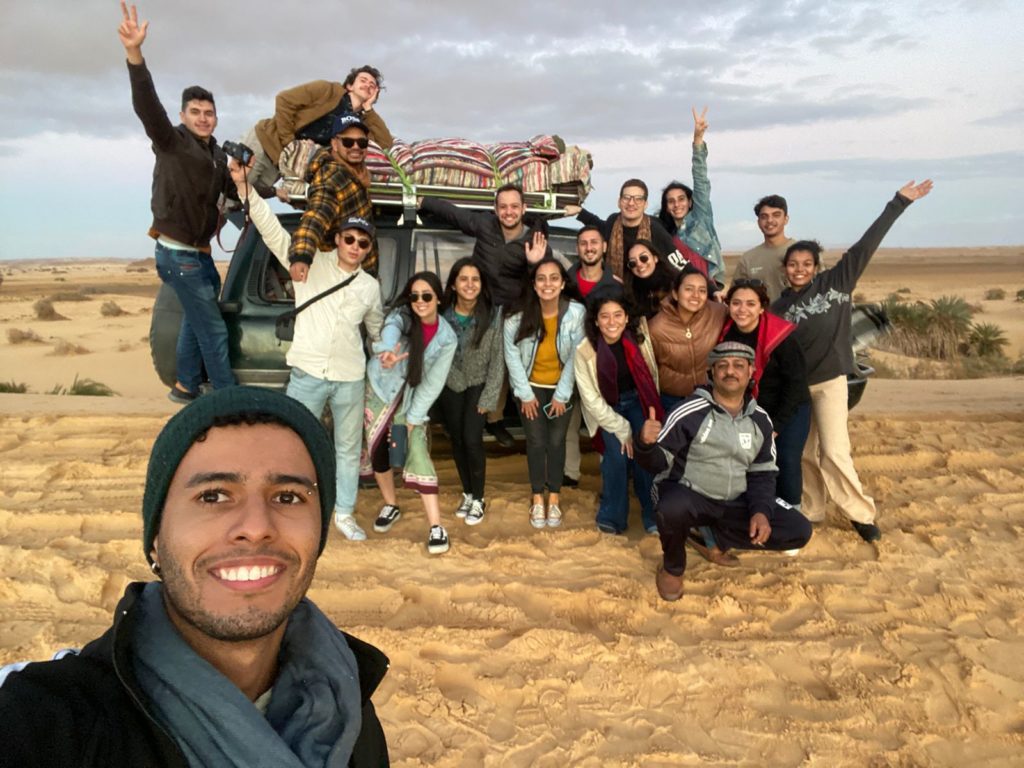São Paulo – Three Brazilians participated in a volunteer work interchange program in Cairo, Egypt, early this year held by AIESEC, an international non-profit aiming to foster both personal and professional growth of young students. Leandro Alexandre studies Architecture, Thiago Gomes studies Software Engineering, and Ramon Santana studies Product Engineering. The three of them participated in a volunteer interchange for 45 days starting January 1st. In an interview with ANBA, they shared a little of their experiences.
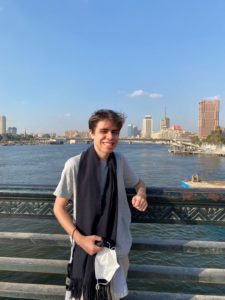
Leandro Alexandre is 23 years old and participated in a project involving architecture and sustainability and worked primarily with Islamic architecture during his interchange. He studies Architecture in the Anhembi Morumbi University in São Paulo.
“The project delved into the Islamic architecture that developed after the 6th century in Cairo and went far beyond what I had learned in my History classes. It also fostered heritage education, showing that Egypt has so much more to explore beyond the pyramids,” Alexandre said.
He led outdoors tours together with an Egyptian coordinator where he talked about the history of the buildings, how the city developed and the future and restoration projects. “In addition to getting to know the city and the architecture, I learned about traditional practices and the project aimed to raise awareness on the importance of that place,” he said. Tourists came from countries like Sweeden and the United States.
Leandro Alexandre said that he’ll create maps and graphic materials like booklets and sketches about the Islamic architecture, showing its main features. He also has a sustainability project examining São Paulo’s Pinheiros River and Cairo’s Nilo River.
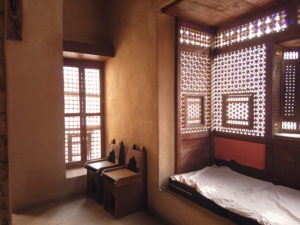
“It’s interesting to think that many features from the Islamic architecture have been added to the Brazilian architecture, such as the mashrabiya, a type of projecting oriel window enclosed with carved wood latticework,” he said.
The mashrabiya is found in mosques and traditional houses of the Ottoman period. In Brazil, they’re known as cobogós, made of concrete and ceramic. He gave the example of the Cais do Sertão Museum in Recife.
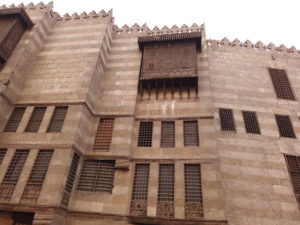
Alexandre talked about the importance of heritage education and how people that carry out this work should be appreciated. “This preserves culture, jobs, everything,” he said.
Egypt was the first Arab country Alexandre has ever visited. “It was a tremendous cultural shock, as the way they see and experience the city is very different, which is very rich. People were very warm; when they found out I was Brazilian, they lived for it – some people even stopped us to take a picture,” he said. The student aims to pursues a master’s degree and a PhD in heritage and environment.
Thiago Gomes (in the forefront of the cover picture) is 21 and studies Software Engineering in the Pontifical Catholic University (PUC) Minas in Belo Horizonte. He worked in Downtown Cairo as an AIESEC global volunteers, where he taught computing and technology for refugee children and gave English conversation classes for refugee adults. This was his first plane trip and the first time he left Brazil. He chose Egypt as it’s very different from Brazil, with another religion and language, and for being in another continent.
“It’s very rewarding to know that I’m helping people through knowledge,” Gomes said. In the English conversation classes, he shared information on technology, labor market, opportunities and areas of expertise. “The field has grown a lot with the pandemic, and people are greatly interested,” he said.
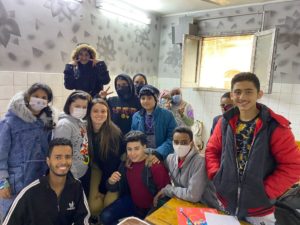
With the children, he had the chance to give technology introduction classes. “We must remember that they had never come in contact with computers, so it was crucial to show them how important this knowledge is so that they can know the basics,” he said. The classes were challenging and featured some barriers like language, as many children didn’t speak English. Gomes taught them how to turn on a computer, use a keyboard and a mouse, and he showed them how to use Windows and Word. Most refugees came from Syria and South Sudan.
“The Egyptian people is very joyous, and they have a way of being very similar to ours. They’re very friendly to foreigners, and very fraternal and affectional between them. They also love football, and they use to watch it in coffeeshops that are similar to our bars,” he said.
The student had worked with refugee people in Brazil before, giving Portuguese classes to Venezuelan refugees in São Paulo. Gomes said he felt very safe in Egypt, and that he enjoyed the cultural shock. He is supposed to graduate in 2023 and plans o starting his own software development agency.
Ramon Santana is 26 years old and is studying Product Engineering in the Federal University of Espírito Santo. This was his first plane trip, and he said he chose Egypt for being the most different culture as possible. His volunteer work in Cairo was focused on environmental sustainability, such as recycling materials and product sales.
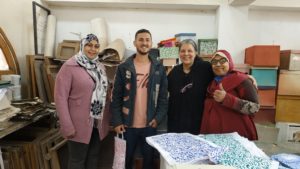
He said that the project used rice straw, a waste from rice farming in Egypt, to create paper and manufacture different types of notebooks and picture frames. “We cooked the rice straw and chopped it; it was a whole process to turn it into paper,” he said. The notebooks were sold and donated. The project also made paper bags from books that would be thrown away. Two Egyptian women coordinated the project and produced the objects.
“I believe this type of project is extremely necessary; the environmental awareness part is fundamental. Cairo is still not up to date in environmental and sustainability issues, and this project is a starting point for an awareness that has grown in Egypt, and I really enjoyed being part of this. It’s important to make this type of action to spread knowledge,” he said.
He said he felt welcomed by the Arab country and that the Egyptians were welcoming. “I had never left my country, and the Egyptians seems to really like Brazilian people. I felt very safe, and I visited very beautiful tourist attractions like the pyramids,” he said.
The AIESEC volunteer interchange program offers an allowance for the students to stay in accredited hostels. The plane ticket and subsistence are paid by the students.
Translated by Guilherme Miranda



